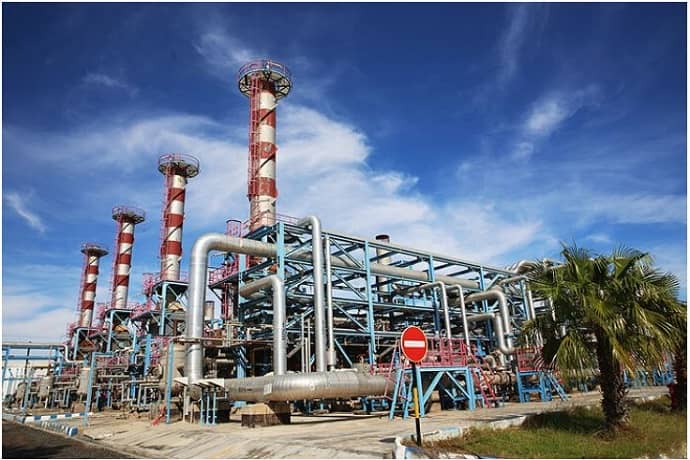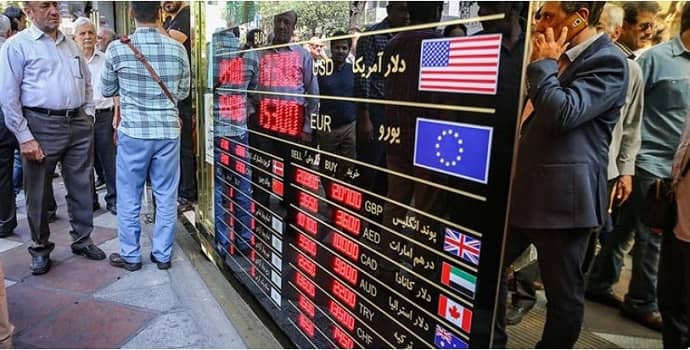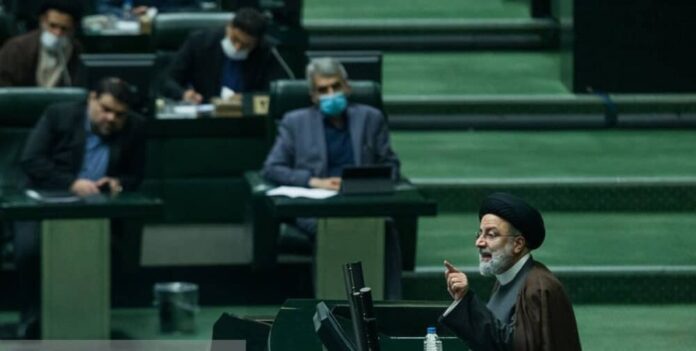On Sunday, January 9, the Iranian regime’s Majlis (parliament) hastily approved the government’s general budget for 2022-2023 with 174 votes in favor and 76 against. Meanwhile, many of the regime’s experts warn about the severe economic consequences of this budget, mainly the regime’s decision to remove the official exchange rate of 42,000 rials to a dollar.
The Iranian regime’s president, Ebrahim Raisi, addressed the parliament on Sunday, defending his government’s budget. As usual, Raisi denied the country’s current economic crunch, caused by systematic corruption, mismanagement, and ineptitude.
“The inflation rate, unprecedented in the last five decades, is now going downward. This downward trend [is coupled] with the 40 percent increase in non-oil exports,” Raisi claimed.
Meanwhile, the statistics provided by the regime’s experts stand at odds with Raisi’s bold-faced lies.
“People’s current salaries prevent them from making ends meet due to the growth of inflation and prices of consumer goods, housing, and medicine. Not just individuals but families have become homeless, and they are now sleeping on buses, graves, water canals, etc.,” Mohamad Reza Mahboubfar, a regime sociologist, acknowledged on January 8, according to the state-run Eghtesad-e Pouya daily.
According to the engineered statistics announced by the Statistical Center of Iran, the inflation rate has reached 35.2 percent. The itemized inflation rate for food items has reached 41.5 percent.
Ehsan Khandoozi, Raisi’s Minister of Economy, acknowledged on December 18 that Iran, under the mullahs’ regime, is “one of the few countries with the high inflation rate around the world.”

Oil Exports
As a part of his litany of lies on Sunday, Raisi also claimed that “despite the popular belief that we cannot export oil and generate revenue, we witnessed increasing oil exports and revenues.”
By stretching the truth about Iran’s low oil exports and subsequent revenues, Raisi tried to justify his decision to draft a budget bill relying on illusional expectations to sell 1.2 million BPD of oil.
Meanwhile, the admissions made by Massoud Mirkazemi, head of the Planning and Budget Organization, on Sunday debunk Raisi’s claims about oil exports.
“In [the Persian Year of] 1401, we have estimated to generate revenue by exporting 1.2 million BPD. Many of our friends question this decision. Selling 1.2 BPD per day at $60 per barrel would get us $26 billion. When you deduct the share of the National Sovereign Fund and the share of the National Oil Company, 62.5% or $16 billion remains. Meanwhile, we must put 3.8 quadrillion rials in the treasury for current and construction expenses. Besides, we must pay for keeping the official exchange rate. How could this be possible?” he said according to the state-run Tasnim News Agency on Sunday.
Comprehensive sanctions imposed on the regime’s oil exports have crippled this industry. The Iranian regime has used oil revenues for years to continue its illicit activities, such as regional adventurism and developing its clandestine nuclear program.
It is worth noting that the government of Mahmoud Ahmadinejad earned around $700billion from oil exports. This did not improve people’s lives, as they were pushed further into the swamp of poverty.
In a nutshell, Raisi’s claims about oil exports are part of his smoke and mirrors tactic to somehow reduce society’s rage and fury.

Removing the Official Exchange rate
The most important element of Raisi’s budget is eliminating the official exchange rate of 42,000 rials to a dollar. Yet, this action would adversely affect consumer goods’ prices.
“We are going to continue allocating the official exchange rate for the next few months, as we have to prepare the ground for removing it. Besides, the Supreme Leader instructed us to continue the current economic situation [and not eliminate the official exchange rate] until we find a durable solution,” Raisi said on Sunday.
Hassan Rouhani’s government introduced the official exchange rate and allocated it to the “private sector” for importing essential food items and medicine. As with any other of the mullahs’ economic plans, the official exchange rate was mostly allocated to the regime’s insiders, who used it to import luxury goods or sell the essential items at a much higher price in the free market. The so-called “private” companies are the front companies of the Revolutionary Guards (IRGC).
Since the regime did not have enough currency, it started printing banknotes. As a result, Iran’s liquidity rapidly increased, and since the country’s production rate is very low, the inflation rate promptly grew, causing prices of consumer goods to skyrocket.
Rouhani attempted to remove the official exchange rate and had estimated that his government would earn at least 600 trillion rials. If Raisi suspends or removes the official exchange rate, his government would earn around $2 billion, with the current exchange at a free market rate of 280,000 rials to a dollar.
It is safe to say that Iran’s ruling theocracy would not benefit much, and this action will not address the country’s economic woes. Nevertheless, by removing the official exchange rate, consumer goods and medicine prices will soar, adding more pressure on people who can hardly make ends meet.
In reaction to the consequences of removing the official exchange rate, Rahim Zare, spokesman for the Budget Consolidation Commission, told Khane Melat News Agency: “Government policy is not transparent. The commission has approved the conditional elimination of the official exchange rate so the government could guarantee those essential items will be available to the public at a fixed price without change.”
“We warn Mr. Raisi that society is not prone to this issue. Do not disturb society. Assess the conditions in the region. Assess the power of the people,” Mehdi Asgari, another MP, warned Raisi on Sunday, according to Majlis’s official, Khane Melat News Agency.
In addition, the state-affiliated economists have been warning about removing the official exchange rate and its consequence, as it will create a currency shock and massive market fluctuations. Some experts believe that Raisi’s government has already stopped allocating currency at the official exchange rate for importing the medicine, as the prices of medications have tripled in recent months.
The removal of the official exchange rate makes it abundantly clear that the regime is neither willing nor capable of addressing the fundamental crises gripping the Iranian society. Tehran needs every penny for continuing its malign activities, such as funding its terrorist proxy groups in the Middle East.
Conclusion
In his remarks on Sunday, Raisi claimed that he sees “the situation better than any time. We have a bright and promising future, and everything is ready to make important decisions.”
Raisi is pulling the wool over his own eyes. Daily protests by Iranians from all walks of life due to the economic woes and their slogans against the regime and its policies show that Iran’s society is on the verge of explosion.
The country’s increasing social and economic crises have aggravated the regime’s infighting. Ali Khamenei, the mullahs’ Supreme Leader, handpicked the parliament and appointed Raisi as president to consolidate power to implement his policies to oppress further and plunder more. Now, regime MPs warn about the consequences of Raisi’s budget plan, and seventy-six MPs voted against it. This action reflects the depth of crisis within the regime.
However, as the prospect of another popular uprising looms, Khamenei and Raisi have to make important decisions. But, how?
Increasing plunder and oppression will add to society’s explosive state and result in a revolution. On the other hand, to respond to people’s demands, the regime must stop funding terrorism or its nuclear program. But, that’s the deadly paradox the mullahs are facing: without the export of terrorism or domestic oppression, Khamenei knows his regime will not last a day. In a nutshell, the regime is in a deadlock.





